中考英语容易混淆的单词和词组解析
中考英语常用易混淆单词词组的区别用法详解
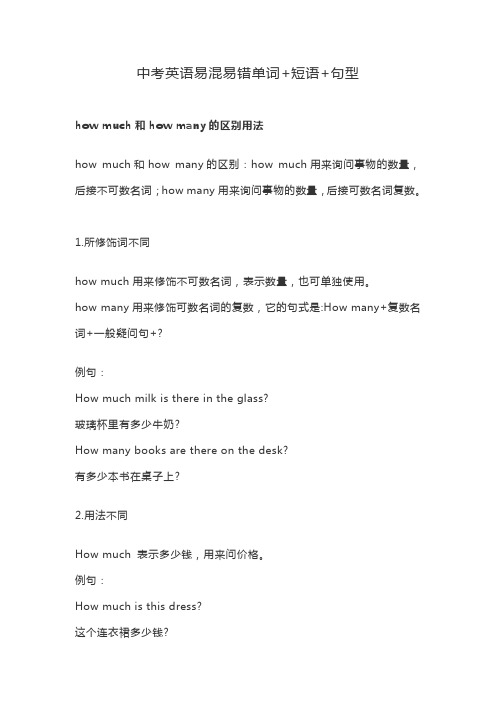
中考英语易混易错单词+短语+句型how much和how many的区别用法how much和how many的区别:how much用来询问事物的数量,后接不可数名词;how many用来询问事物的数量,后接可数名词复数。
1.所修饰词不同how much用来修饰不可数名词,表示数量,也可单独使用。
how many用来修饰可数名词的复数,它的句式是:How many+复数名词+一般疑问句+?例句:How much milk is there in the glass?玻璃杯里有多少牛奶?How many books are there on the desk?有多少本书在桌子上?2.用法不同How much 表示多少钱,用来问价格。
例句:How much is this dress?这个连衣裙多少钱?How many 表示多少,用来问数量。
例句:How many apples do you have?你有多少苹果?in和on的区别用法当我们表示某些东西被其他东西所包围时使用“in”这个词。
而“on”用于描述物体被放置在其他物体上方或外部的情况。
in可表时间,表地点,表手段、方法、材料。
on表示时间、地点、方位等。
1.意思不同in:prep.在... 里;在... 地方;在... 期间on:prep.在... 之上2.用法不同in:in着重一段时间的过程,常用于重复动作或延续动作。
in表示从现在时间算起推移到将来的一段时间之后,一般与将来时态连用。
例句:He is a layman in economics.他对经济学一窍不通。
on:表示“在物体的表面上”,只能用on的表达方式有on the next morning,on the following。
例句:The spider is walking on the ceiling.蜘蛛在天花板上爬行。
3.侧重点不同in:表示“在其中”。
on:表示“在表面”。
中考英语78个易混易错单词+短语+句型(全)
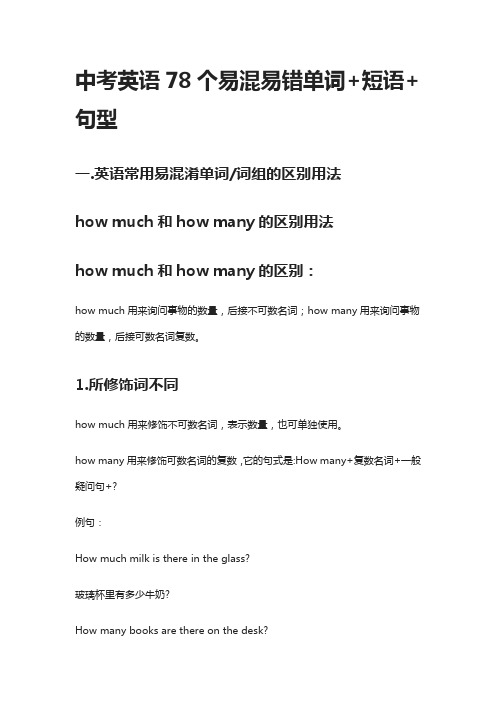
中考英语78个易混易错单词+短语+句型一.英语常用易混淆单词/词组的区别用法how much和how many的区别用法how much和how many的区别:how much用来询问事物的数量,后接不可数名词;how many用来询问事物的数量,后接可数名词复数。
1.所修饰词不同how much用来修饰不可数名词,表示数量,也可单独使用。
how many用来修饰可数名词的复数,它的句式是:How many+复数名词+一般疑问句+?例句:How much milk is there in the glass?玻璃杯里有多少牛奶?How many books are there on the desk?有多少本书在桌子上?2.用法不同How much 表示多少钱,用来问价格。
例句:How much is this dress?这个连衣裙多少钱?How many 表示多少,用来问数量。
例句:How many apples do you have?你有多少苹果?in和on的区别用法:当我们表示某些东西被其他东西所包围时使用“in”这个词。
而“on”用于描述物体被放置在其他物体上方或外部的情况。
in可表时间,表地点,表手段、方法、材料。
on表示时间、地点、方位等。
1.意思不同in:prep.在 ... 里;在 ... 地方;在 ... 期间on:prep.在 ... 之上2.用法不同in:in着重一段时间的过程,常用于重复动作或延续动作。
in表示从现在时间算起推移到将来的一段时间之后,一般与将来时态连用。
He is a layman in economics.他对经济学一窍不通。
on:表示“在物体的表面上”,只能用on的表达方式有on the next morning,on the following。
The spider is walking on the ceiling.蜘蛛在天花板上爬行。
3.侧重点不同in:表示“在其中”。
中考英语易混淆词汇辨析
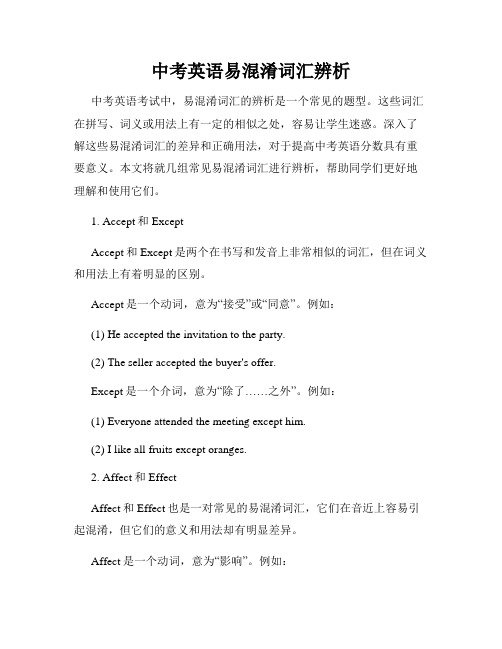
中考英语易混淆词汇辨析中考英语考试中,易混淆词汇的辨析是一个常见的题型。
这些词汇在拼写、词义或用法上有一定的相似之处,容易让学生迷惑。
深入了解这些易混淆词汇的差异和正确用法,对于提高中考英语分数具有重要意义。
本文将就几组常见易混淆词汇进行辨析,帮助同学们更好地理解和使用它们。
1. Accept和ExceptAccept和Except是两个在书写和发音上非常相似的词汇,但在词义和用法上有着明显的区别。
Accept是一个动词,意为“接受”或“同意”。
例如:(1) He accepted the invitation to the party.(2) The seller accepted the buyer's offer.Except是一个介词,意为“除了……之外”。
例如:(1) Everyone attended the meeting except him.(2) I like all fruits except oranges.2. Affect和EffectAffect和Effect也是一对常见的易混淆词汇,它们在音近上容易引起混淆,但它们的意义和用法却有明显差异。
Affect是一个动词,意为“影响”。
例如:(1) The heavy rain affected the traffic.(2) Lack of exercise can affect your health.Effect既可以是名词,意为“效果”或“影响”,也可以是动词,意为“产生影响”。
例如:(1) The medicine has a good effect on curing the disease.(2) His speech effectively influenced the audience.3. Advice和AdviseAdvice是一个名词,意为“建议”或“忠告”。
例如:(1) I need some advice on how to solve this problem.(2) His advice helped me make a decision.Advise是一个动词,意为“建议”。
初中英语最容易混淆的单词、词组归纳总结,都是干货记得收藏
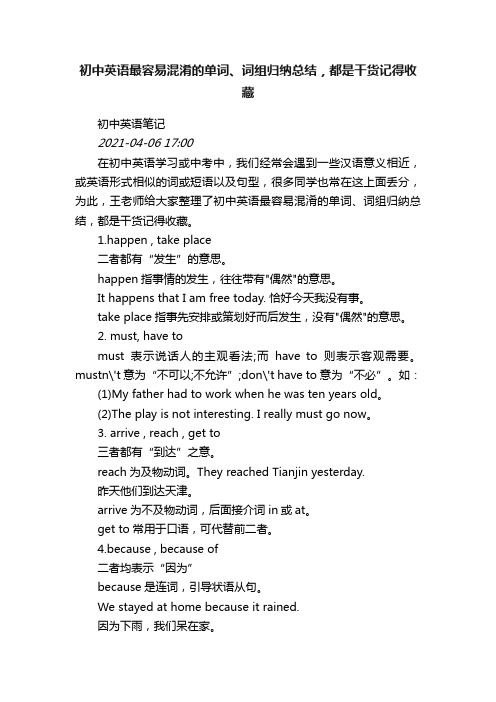
初中英语最容易混淆的单词、词组归纳总结,都是干货记得收藏初中英语笔记2021-04-06 17:00在初中英语学习或中考中,我们经常会遇到一些汉语意义相近,或英语形式相似的词或短语以及句型,很多同学也常在这上面丢分,为此,王老师给大家整理了初中英语最容易混淆的单词、词组归纳总结,都是干货记得收藏。
1.happen , take place二者都有“发生”的意思。
happen指事情的发生,往往带有"偶然"的意思。
It happens that I am free today. 恰好今天我没有事。
take place指事先安排或策划好而后发生,没有"偶然"的意思。
2. must, have tomust表示说话人的主观看法;而have to则表示客观需要。
mustn\'t意为“不可以;不允许”;don\'t have to意为“不必”。
如:(1)My father had to work when he was ten years old。
(2)The play is not interesting. I really must go now。
3. arrive , reach , get to三者都有“到达”之意。
reach为及物动词。
They reached Tianjin yesterday.昨天他们到达天津。
arrive为不及物动词,后面接介词in或at。
get to常用于口语,可代替前二者。
4.because , because of二者均表示“因为”because是连词,引导状语从句。
We stayed at home because it rained.因为下雨,我们呆在家。
because of是短语介词,后面接名词性词语。
We stayed at home because of the rain .因为下雨,我们呆在家。
5. in front of, in the front ofin front of…意思是"在……前面",指甲物在乙物之前,两者互不包括;其反义词是behind(在……的后面)。
202X年中考英语78个易混易错单词+短语+句型
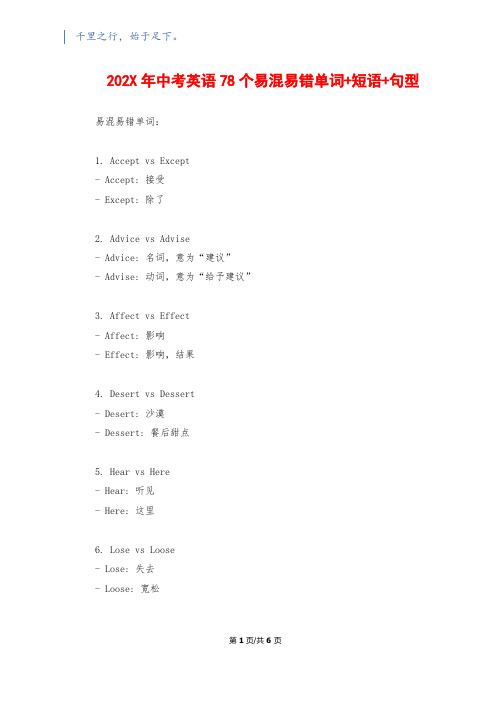
202X年中考英语78个易混易错单词+短语+句型易混易错单词:1. Accept vs Except- Accept: 接受- Except: 除了2. Advice vs Advise- Advice: 名词,意为“建议”- Advise: 动词,意为“给予建议”3. Affect vs Effect- Affect: 影响- Effect: 影响,结果4. Desert vs Dessert- Desert: 沙漠- Dessert: 餐后甜点5. Hear vs Here- Hear: 听见- Here: 这里6. Lose vs Loose- Lose: 失去- Loose: 宽松第1页/共6页7. Weather vs Whether- Weather: 天气- Whether: 是否8. Quiet vs Quite- Quiet: 安静- Quite: 相当9. Principal vs Principle- Principal: 校长- Principle: 原则10. Stationary vs Stationery - Stationary: 静止的- Stationery: 文具11. Than vs Then- Than: 比如- Then: 然后12. Their vs There vs They're - Their: 他们的- There: 那里- They're: they are(他们是)13. Threw vs Through- Threw: 扔- Through: 穿过14. To vs Too- Too: 也,过于15. Its vs It's- Its: 它的- It's: it is(它是)16. Your vs You're- Your: 你的- You're: you are(你是)17. Principal vs Principle- Principal: 校长- Principle: 原则18. Heel vs Heal- Heel: 脚后跟- Heal: 治愈19. Cement vs Concrete- Cement: 水泥- Concrete: 混凝土20. Idle vs Idol- Idle: 闲置的- Idol: 偶像21. Cell vs Sell- Cell: 细胞第3页/共6页22. Fare vs Fair- Fare: 费用- Fair: 公平的23. Foul vs Fowl- Foul: 犯规的- Fowl: 家禽24. Peak vs Peek vs Pique- Peak: 顶峰- Peek: 偷看- Pique: 激怒25. Breath vs Breathe- Breath: 呼吸(名词)- Breathe: 呼吸(动词)易混易错短语:1. By the way vs Anyway- By the way: 顺便问一下- Anyway: 无论如何2. In the meantime vs Meanwhile- In the meantime: 与此同时- Meanwhile: 与此同时3. On the other hand vs On the one hand- On the other hand: 另一方面- On the one hand: 一方面4. It's all Greek to me- 意为“对我来说这都是希腊文”,表示完全听不懂5. Fit as a fiddle- 意为“身体非常健康”6. Break a leg- 意为“祝你好运”7. A piece of cake- 意为“易如反掌”8. Once in a blue moon- 意为“千载难逢”9. Bite the bullet- 意为“咬紧牙关”10. Keep your fingers crossed- 意为“祝你好运”易混易错句型:1. I have been to New York last year.- I went to New York last year.第5页/共6页2. She didn't went to school yesterday.- She didn't go to school yesterday.3. Have you ever been to Paris?- Have you ever been to Paris before?4. I don't know nothing about that.- I don't know anything about that.5. He was tired, so he gone to bed early. - He was tired, so he went to bed early.6. I have lived in this city since 5 years. - I have lived in this city for 5 years.7. I am here for visit my grandparents.- I am here to visit my grandparents.8. We don't have no time for that.- We don't have any time for that.。
中考英语易混词汇辨析

中考英语易混词汇辨析above/over/onacross/throughat all/ after allfew / a few / little / a littleago/ beforealone/ lonelyalready/ yetanswer/ replyarrive /reach/get toagree with/ agree on/ agree toa little/ a bitas/likeafter/inby the way/on the way/in the waybecause/because ofbe afraid that/be afraid ofbig/large/great/ hugebelow/underbetween/ amonganother/ the other/ other/ others/ the othersas/ when/ whileborrow/ lendbring/ take/ fetch/ carrybeat/winbecause/since/forbe made of / be made fromby/ with/ inbe used for/ be used as/ be used bybesides/exceptboth/ allbe anger with/ be angry aboutcatch a cold/have a coldcan/be able todo with/deal withdie/dead/dying/deathdiscover/inventelse/otherevery day/ everydayfamily/ home/housefinal/lastbe famous as/ be famous forforget/leaveforget to do sth./forget doing sth.for example/such asfast / quick/ quicklyget/turn/grow/ becomego to bed/go to sleep/fall asleep/ be asleephappen/take placehave been to/have gone to/have been inhear/listenhow often/how soon/how long/how farhard/hardlyin the corner/at the corner/on the cornerhear sb. doing sth./ hear sb. do sth.hope/ wishif /whetherinteresting/ interestedill/ sickin the tree/on the treein time/on timeinstead /instead ofin front of/ in the front ofin future / in the futurejoin/ take part inaloud/loud/ loudlyleave/ leave forlose / misslook/ seemlook for/ findlook/ see/watch/readmaybe/may bemuch too/ too muchnear/nearlyneither/ noneno/noton/aboutone day/some dayput on/wearpoint at/ point toplant/growproblem/ questionreceive/ acceptreal/ trueraise/risesee sb. doing sth./ see sb. do sth.spend/ take/ cost/paysince/ forso that/so…t hatsound/voice/noisetall/highsay/speak/tell/ talksome/anythe number of/a number oftry to do/ try doingthanks for/ thanks totowards/to。
中考常见易混淆英语单词
中考常见易混淆英语单词1.worth, worthy 与worthwhileworth价值,可贵之处,作形容词时与worthy和worthwhile都是“值得……”的意思,但用法不同,如:This book is worth reading./This book is worth 3 yuan?./It s wort hwhile to visit (visiting) thisplace./This place is worthy of a visit (visiting ).worth只作表语,它后面一般接动名词,也可接名词,但只限于钱数,不接不定式。
如果用不定式或动名词作主语,则要用It s worthwhile…结构,把不定式、动名词放在句末;worthy是形容词,worthy可作表语,也可作定语,作表语时,后跟of接名词或动名词,也可以接不定式。
worthwhile和worth虽均有“值得的”意思,worth只作表语,用于be worth sth.短语中,如:It s worth the trouble.麻烦一点值得。
This watch is worth this much money.这块手表值这么多钱;而worthwhile意为“值得一做的(worth doing)”,既可作表语,如:T hese results were not worthwhile.也可用作定语。
2.rise 与 raise这两个词虽不同义,但因意义上有联系而易被混淆。
rise 上升,上涨,起床,站立。
含义较广,总的意思是指依次上升,如自然界的日、月、星、雾、云的上升,人体从睡、跪、坐、躺等姿势站立起来等。
该词为不及物动词,其过去式与过去分词分别是rose 和 risen。
例如:The sun rises in the east and sets in the west.日出于东而落于西。
/ Prices rise every day in those countries.那些国家里的物价天天上涨。
中考英语之易混淆词汇知识点辨析
一、易错点之易混淆的形近词组1.In front of和in the front of解析:In front of强调在范围外的前面; 而in the front of指在范围内的前面。
例如:The boy sits in the front of the classroom.男孩坐在教室前面。
(这里强调是在教室里面的前排位置)The girl stands in front of the room.女孩站在房间的前方。
(强调在房间外面的前方位置)2.in place of和in the place of解析:in place of代替,等同于insted of; 而in the place of表示在...地方例如:We use gas in place of coal in cooking.我们用煤气代替煤作饭.A new building is being built in the place of the old one.一座新的建筑物正在原来所在建筑物的地方被建。
3.No more than和not more than解析:no more than表示仅仅,只有,相当于only,理解为不多;而not more than表示至多,不超过,小于的意思。
例如:He is no more than an ordinary English teacher. 他只不过是个普通的英文老师。
He has not more than three children. 他最多3 个孩子(有或许还不到三个)4.On earth和on the earth解析:两者都有在地上,在地球上的意思,但on earth还有到底,究竟的意思;On the earth只是单纯的表示在地上,在地球上例如:where on earth did you spring from?你究竟从哪里冒出来的?What if there was no lead on the earth at all?如果地球上根本就没有铅这种物质怎么办?5.At all和after all解析:at all表示根本,全然的意思,常用短语not at all表示一点也不;after all表示到底,毕竟的意思例如:I don't know him at all. 我根本不认识他。
初三英语词汇辨析常见错误
初三英语词汇辨析常见错误在初三英语的学习中,词汇辨析是一个重要的部分,但同学们在这方面常常会出现一些错误。
以下是一些常见的错误类型及分析。
一、混淆近义词很多同学容易将意思相近的单词用错,比如“alone”和“lonely”。
“alone”侧重于“独自一人”,表示客观上的状态;而“lonely”则侧重于“孤独的、寂寞的”,更多地表达一种主观感受。
例如:He was alone in the room(他独自一人在房间里。
)He feels lonely because he has no friends (他感到孤独,因为他没有朋友。
)再比如“take”“bring”和“fetch”。
“take”表示“带走、拿走”,是把某物从说话者所在的地方带到别的地方;“bring”表示“带来、拿来”,是把某物从别的地方带到说话者所在的地方;“fetch”则表示“去取来、去拿来”,强调一个往返的动作。
例如:Take this book to the library(把这本书带到图书馆去。
)Bring me a cup of coffee(给我拿一杯咖啡来。
)Please fetch my bag from the classroom(请从教室把我的包拿来。
)二、忽略词汇的词性有些单词虽然拼写相同,但词性不同,意思和用法也不同。
比如“interest”这个词,既可以作名词,表示“兴趣”,也可以作动词,表示“使感兴趣”。
例如:My interest is reading(名词,我的兴趣是阅读。
)This book interests me(动词,这本书使我感兴趣。
)再如“success”是名词,“succeed”是动词,“successful”是形容词。
我们要说“He succeeded in the exam”(他考试成功了。
)而不能说“He successed in the exam”三、误解短语动词的含义短语动词也是同学们容易出错的地方。
中考英语常用易混淆单词词组的区别用法详解
中考英语易混易错单词+ 短语+ 句型how much 和how many 的区别用法how much 和how many 的区别:how much 用来询问事物的数量,后接不可数名词;how many 用来询问事物的数量,后接可数名词复数1. 所修饰词不同how much 用来修饰不可数名词,表示数量,也可单独使用。
how many 用来修饰可数名词的复数,它的句式是:How many+ 复数名词+ 一般疑问句+?例句:How much milk is there in the glass? 玻璃杯里有多少牛奶?How many books are there on the desk?有多少本书在桌子上?2. 用法不同How much 表示多少钱,用来问价格。
例句:How much is this dress?这个连衣裙多少钱?How many 表示多少,用来问数量。
例句:How many apples do you have?你有多少苹果?in 和on 的区别用法当我们表示某些东西被其他东西所包围时使用“ in ”这个词。
而“ on 用于描述物体被放置在其他物体上方或外部的情况。
in 可表时间,表地点,表手段、方法、材料。
on 表示时间、地点、方位等。
1. 意思不同in :prep. 在... 里;在... 地方;在... 期间on :prep. 在... 之上2. 用法不同in :in 着重一段时间的过程,常用于重复动作或延续动作。
in 表示从现在时间算起推移到将来的一段时间之后,一般与将来时态连用。
例句:He is a layman in economics.他对经济学一窍不通on :表示“在物体的表面上”,只能用on 的表达方式有on the next morning ,on the following 。
例句:The spider is walking on the ceiling.蜘蛛在天花板上爬行。
- 1、下载文档前请自行甄别文档内容的完整性,平台不提供额外的编辑、内容补充、找答案等附加服务。
- 2、"仅部分预览"的文档,不可在线预览部分如存在完整性等问题,可反馈申请退款(可完整预览的文档不适用该条件!)。
- 3、如文档侵犯您的权益,请联系客服反馈,我们会尽快为您处理(人工客服工作时间:9:00-18:30)。
中考英语容易混淆的单词和词组解析在初中英语学习或中考中经常会遇到一些汉语意义相近,或英语形式相似的词或短语以及句型。
只有真正了解意思才能做到准确无误。
希望以下的练习有助于你的归纳。
Fill in the bla nks with the give n words in their proper forms.1. affect/effect1) _____________________ Nothing can our friendship even if we live in different places.2) Alcohol has a very bad __________ on drivers.2. a great deal of/a great deal1) There is _____________ i n formatio n in the in ternet.2) Don't eat _________ before swim ming.3 . a lot of/ a lot1) There are ________ visitors in Nanjin Road Walkway each weeke nd.2) During holiday some stude nts sleep ________ in the day.4. much/little/a little/huge amounts of/a huge amount of/many/few/a few 修饰可数名词 a nu mber of/ma ny/a few/few修饰可数或不可数名词 a lot of= lots of= ple nty of修饰不可数名词 a great deal of/a huge amount of= huge amounts of/much/alittle/little1) There isn't ________ ink in the bottle.2) Are there _________ boys play ing basketball in the street?3) Come on! There is ________ time left.4) Don't worry, it's only nine o'clock. We still have _________ t ime.5) It's snowing heavily. There are ________ cyclists in the streets.6) He is very careless. He always makes _______ mistakes in his test paper.7) The little girl got _______ m oney from her pare nts whe n she was only ten.5. a number of/the number of1) ________ t he stude nts in this school is one thousa nd two hun dred and eleve n.2) ________ p eople have applied for this job.6. aboard/abroad1) Do you want to go _________ t o further your study whe n you grow up?2) Look, Stone is already ________ the ship.7. agree with/agree to1) Do you ________ m e about the pla n?2) We all ________ t he arran geme nt.8. alive/living1) The dying man over there is still _________ .2) All ______ t hings can't live without air or water.9. all of/none of/both of/neither of/either of/some of/many of/few of/much of1) ________ u s have to go to school at the age of eight.2) ________ t he two an swers is correct.3) In China _______ the pilots was woma n many years ago.4) I don't want ________ the two scarves. Please show me ano ther.5) ______ my pare nts got retired and lived with my youn ger brother in Japa n.6) ______ the stude nts like to see that film.7) ______ the boys like play ing basketball.10. alo ne/lo nelyMy gran dpa lives __________ , but he has a lot of frien ds, so he n ever feels11. answer/reply1) Can you __________this questi on right now?2) What did he do in ___________ to your challe nge?12. at table/at the table1) The man sitt ing _______ is the new man ager of this restaura nt.2) Childre n must lear n to behave _______ .13. be familiar to/be familiar with1) I am not very __________ pop sin gers.2) Our n ati onal an them ________ each of the stude nts, even the kids innu rseries.14. full/fill1) Will you please ________ in this form with a pen?2) She was _________ of news. That means she could n't stop herself talking about it.15. be located/sta nd/lie1) Shan ghai ________ in the east of China.2) That quiet small tow n is _________ a t the foot of the mountain.3) A clock _________on the sideboard was an an tique.16. be made of/be made from/be made in1) This watch ________ Japan in 2002.2) Bread ________ w heat.3) The blackboard ________ glass and wood.17. beat/win1) Mum always ________ me whe n we played chess before I was eight years old.2) To my surprise, two of the stude nts in our school _______ the first prize in the En glish con test this year.3) He ________ me at table tennis yesterday.18. beside/besides/except/except for1) This compositi on is well writte n _______ a spelli ng mistake.2) The girl sitt ing ________ Ms. Gree n is from Sin gapore.3) We have seve n less ons every day ______ Saturday and Sun day.4) All the stude nts atte nded the lecture _______ the teachers.19. borrow/lend/keep1) Could you tell me how long I can ________ the VCD?2) I have no MP3, may I ________ yours?3) You'd better not ________ my laptop to others.20. brin g/take/fetch/carry1) Would you please ________ your umbrella in the next room. It's raining outside. 2) Remember to ________ your homework tomorrow.3 ) It's gett ing win dy, you'd better ________ a coat with you while you are out.4) Light trai ns always _______ ple nty of people to and from work in rush hours.21. cabbage /fish1) I bought lots of___________ yesterday.2) _________ was served after the first course.3) They caught several frogs, crabs and __________ in the river yesterday.4) I think you'd better eat some more _________ vegetables are good for you.22. can/may/must1) We __________ follow the in struct ions whe n we use the computers.2) _________ I have a look at your photos?3) I thought I _________ smell someth ing burning.23. die of/die from1) Nowadays more people _________ car accide nts on high ways.2) In fact the little baby _________ a fever last ni ght.24. drop/fall1) The vase __________ and broke.2) Jenny's voice _________ as the class teacher en tered the classroom. 25. elderly/elder/older1) Air polluti on can cause respiratory problems, especially in childre n and the2) My __________ brother is ten years ___________ tha n I.26. electricity/electric/electricia n/electro nic/electrical1) Make sure that lights and other ___________ a pplia nces are tur ned off whe nnot n eeded.2) Avoidi ng using _________ dict ionary while doing some read ing.3) Simon's father used to be an _________ .4) I got an __________ shock from that faulty light switch whe n I wasfourtee n.5) Don't leave the TV on, it wastes __________ .27. excited/excit ingAll of us were __________ at the ___________ n ews yesterday.28. fall/feel1) The doctor __________ my forehead and said, "You have got a high fever. II2) Many trees _________ in the sand storm last ni ght.29. asleep/sleepy/sleep/sleep ing1) The driver felt __________ last ni ght, so he fell __________ as soon as helay in bed.2) When do you go to __________ every day?3) I took a __________ -car to Beiji ng last Friday.30. find out/find/discover/invent/look for/search for1) Columbus __________ America in 1492.2) Do you know who first ___________ clock?3) Jane __________ h er key to the drawer everywhere just now, but shecould n't __________ i t.4) Please try to _________ who broke the wi ndow.5) The police __________ t he crimi nals for hours this morni ng.参考答案与解析1 . affect是一个动词,它的意思为影响、感染”。
